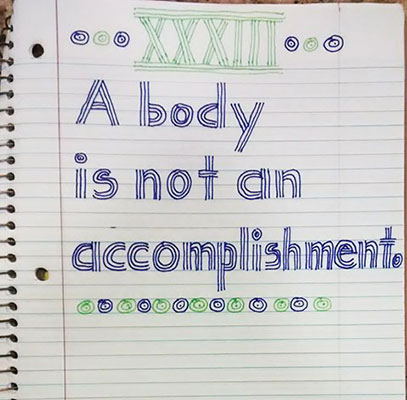An Accomplished Body
A colleague of mine, Charlie Shipley creates The No-Diet Not The No-Diet Notebook where he shares the simplest hand drawn words in support of living a diet-free, body-loving life. They're pure, bite-sized brilliance. I shared this entry with one of my Feast cohorts.
A student replied, “I think having a fit body is an accomplishment. What am I getting wrong here?”
Her question coincided with the kickoff of the Olympics and the world’s celebration of super-human feats.
But is a fit body an accomplishment?
Let’s take a deeper look.
The first thing we need to do is separate out a fit body as defined by abilities (endurance, flexibility, strength, balance, etc.) and a fit body as defined by appearance standards. The latter, a fit-appearing body, is not an accomplishment at all. There is nothing superior about a body that conforms to society's narrow and incorrect standard of what a fit body looks like.
Athletes of the highest caliber come in all forms. It's a myth that you have to have a flat stomach or thighs that don't touch or low body fat percentage in order to compete in sports. At the height of my anorexia, strangers would openly comment on my body making it clear that they equated my thinness with health and fitness. “You must work out.” they’d say when my reality was days spent in bed too weak to move from severe starvation.
My partner has a sturdy build, broad shoulders, and strong arms. He doesn’t lift weights ever. He’s of Polish descent and this is simply the body shape his genetics produce. Nevertheless, people make assumptions about him based on his appearance all the time.
Fit people come in all shapes and sizes.
They have round bellies and thighs that touch. Strong people can come in bodies that look weak. Likewise, unfit people come in bodies that appear fit.
Bottom line: we simply cannot know from looking at someone if they are healthy or not and as such, appearing in a fit body is not an accomplishment.
Now if we're talking about a fit body in terms of performance, it all depends on one's personal values. It depends on personal values because physical fitness is not objectively (or universally) an accomplishment. It depends on what is important is to you and what your motivation is.
Personally, it’s not important to me that I can swim fast or lift large amounts of weight. It is important to me that I feel good in my body, am able to enjoy and live my life (go hiking, swim in the ocean, carry my groceries up stairs, etc). These are my values. Michael Phelps, Misty Copeland, and possibly the student who asked the question, have different values when it comes to fitness. That’s okay. It’s personal. If I don't value these things I'm not less accomplished. I am likely accomplished in different ways.
Remember: all bodies are good bodies. ALL BODIES ARE GOOD BODIES.
We rank bodies for sport in our culture, but we don’t need to and doing so is violent. It’s okay to opt out of the body comparison game, as it's a game that ultimately hurts us all.
It’s also important to explore our motivations for pursuing fitness. As I told my student: WHAT we’re doing doesn’t matter so much as WHY we’re doing it. Whether leaving food on our plate or asking for a second helping, running a 5K, or napping on the couch--why are we doing it?
Are we doing it because it feels good to us and brings us joy? Are we doing it because we feel like we're not enough? Are we acting out of fear? Are we doing what we want or what we think you should do? I strive to act from a “wholesome" why. To move in response to self-awareness, embodiment, kindness, self-compassion, sustainability, a personal desire to feel alive, connected, and of service. We could be the fittest person in the world, but if we got there because being fit is a way to compensate for feeling like we’re not enough or to be accepted, loved, or approved of--I question the blanket awarding of the label “accomplished”.
We also need to be careful when using a word like "accomplished" as there is an implication that one who is not accomplished is lacking, failing, and unfinished or incomplete. We want our language to make room for celebrating individual success while not shaming those who define success differently.
A final note: there are real life circumstances that can impede traditional fitness pursuits or results. They include but are not limited to poverty, mental illness, physical illness, physical disability, and serving as a caretaker. Having the time and resources to devote to fitness is often a luxury and privilege. So is a fit body an accomplishment?
No, unless it's important to you, available to you, and supportive of you. And even then, you very well might not look like the picture of fitness and that's just fine.


